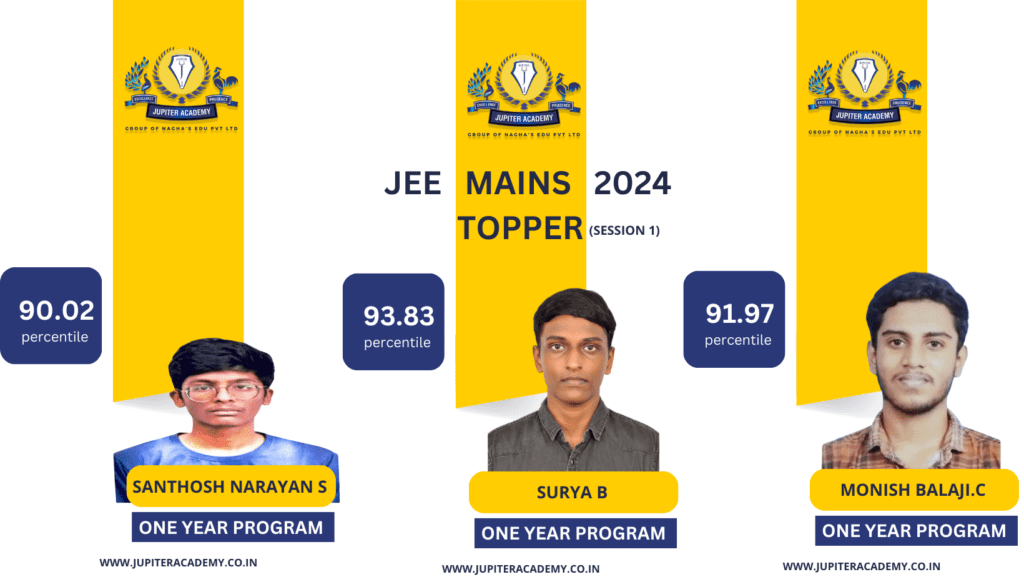
JEE Main New Syllabus With Weightage 2024

JEE Mains New syllabus with the weightage of the topics. Those who are appearing in the JEE Mains 2023 exam can visit the official website. The JEE Mains 2023 syllabus PDF will be available here for the candidates.
Thank you for reading this post, don't forget to subscribe!Chemistry:
- Physical Chemistry (Weightage: 35-40%)
- Organic Chemistry (Weightage: 25-30%)
- Inorganic Chemistry (Weightage: 25-30%)
| Important Topics | Number of Questions | Marks |
|---|---|---|
| Transition Elements and Coordination Chemistry | 3 | 12 |
| Periodic Table and Representative Elements | 3 | 12 |
| Thermodynamics and Gaseous state | 2 | 8 |
| Atomic Structure | 2 | 8 |
| Chemical Bonding | 2 | 8 |
| Ionic and Chemical Equilibrium | 2 | 8 |
| Nuclear chemistry and Environment | 2 | 8 |
| Solid state and surface chemistry | 2 | 8 |
| Redox reaction | 1 | 4 |
| Mole concept | 1 | 4 |
| Chemical Kinetics | 1 | 4 |
| Electrochemistry | 1 | 4 |
| General organic chemistry | 1 | 4 |
| Solution and colligative properties | 1 | 4 |
| Hydrocarbon | 1 | 4 |
| Stereochemistry | 1 | 4 |
| Alkyl Halides | 1 | 4 |
| Aromatic Compounds | 1 | 4 |
| Carboxylic acid and their derivatives | 1 | 4 |
| Carbohydrates,amino acid and Polymers | 1 | 4 |





JEE Main 2023 Syllabus with Weightage for Physics (Topic wise)
- Mechanics (Weightage: 25-30%)
- Electrostatics and Magnetism (Weightage: 18-20%)
- Optics (Weightage: 10-12%)
- Modern Physics (Weightage: 12-15%)
- Thermodynamics (Weightage: 8-10%)
| Chapters | No. of Question | Marks |
|---|---|---|
| Modern Physics | 5 | 20 |
| Optics | 3 | 12 |
| Heat and Thermodynamics | 3 | 12 |
| Electrostatics | 3 | 12 |
| Current Electricity | 3 | 12 |
| Magnetics | 2 | 8 |
| Kinematics | 1 | 4 |
| Unit, Dimension and Vector | 1 | 4 |
| Work, Energy and Power | 1 | 4 |
| Laws of motion | 1 | 4 |
| Rotation | 1 | 4 |
| Gravitation | 1 | 4 |
| Centre of Mass, Momentum, and impulse | 1 | 4 |
| Solids and Fluids | 1 | 4 |
| Simple Harmonic Motion | 1 | 4 |
| Waves | 1 | 4 |
| EMI – AC | 1 | 4 |





JEE Main 2023 Syllabus with Weightage for Mathematics (Topic wise)
Get here the JEE Mains 2023 syllabus with its weightage for Mathematics in a chapter-wise manner.
- Algebra (Weightage: 22-24%)
- Trigonometry (Weightage: 6-7%)
- Calculus (Weightage: 30-32%)
- Coordinate Geometry (Weightage: 22-23%)
- Vectors and 3D Geometry (Weightage: 6-7%)
- Probability and Statistics (Weightage: 6-7%)
| Chapters | No. of Question | Marks |
|---|---|---|
| Coordinate Geometry | 5 | 20 |
| Integral Calculus | 3 | 12 |
| Limits, Continuity and Differentiability | 3 | 12 |
| Matrices and Determinants | 2 | 8 |
| Complex number and Quadratic Equations | 2 | 8 |
| 3d Geometry | 2 | 8 |
| Statistics and Probability | 2 | 8 |
| Vector Algebra | 2 | 8 |
| Permutation and Combinations | 1 | 4 |
| Sets, Function and Relation | 1 | 4 |
| Sequences and Series | 1 | 4 |
| Binomial theorem and its application | 1 | 4 |
| Mathematical Reasoning | 1 | 4 |
| Differential Equation | 1 | 4 |
| Statics and Dynamics | 1 | 4 |
| Differential Calculus | 1 | 4 |





JEE Mains Syllabus With Weightage – JEE Mains Important Chapters to Cover in Mathematics
| Units | Important Chapters |
| Sets, Relations and Functions |
|
| Complex numbers and quadratic equations |
|
| Matrices and Determinants |
|
| Permutation and Combination |
|
| Sequence and series |
|
| Binomial theorem and its simple applications |
|
| Integral Calculus |
|
| Limit , continuity and differentiability |
|
| Co-ordinate Geometry |
|
| Differential Equations |
|
| 3D Geometry |
|
| Vector |
|
| Trigonometry |
|
| Statistics and Probability |
|
| Mathematical Reasoning |
|
JEE Mains Syllabus With Weightage – Important Chapters to Cover in Physics
| Units | Important Chapters |
| Physics and Measurement |
|
| Rotational Motion |
|
| Work, Energy and Power |
|
| Kinetic Theory of Gases |
|
| Properties of Solids and Liquids |
|
| Communication Systems |
|
| Electromagnetic Induction and Alternating currents |
|
| Experimental Skills |
|
JEE Mains Syllabus With Weightage – Important Chapters to Cover in Chemistry
| Units | Important Chapters |
| Some basic concepts in chemistry |
|
| Atomic Structure |
|
| States of Matter |
|
| Redox Reaction and Electrochemistry |
|
| Chemical Thermodynamics |
|
| S-block elements |
|
| d and f block elements |
|
| Co-ordination Compunds |
|
| General Principle and process of Isolation of metals |
|
| Some Basic Principles of Organic Chemistry |
|
| Purification and Characterisation of Organic Compounds |
|
| Organic Compounds containing Oxygen |
|
| Organic Compounds containing Halogens |
|
| Principles Related to Practical Chemistry |
|
| Chemistry in Everyday life |
|
| Classification of Elements and Periodic table |
|
| Chemical Bonding and Molecular Structure |
|


jee main new syllabus with weightage 2024
jee main new syllabus with weightage 2024
jee main new syllabus with weightage 2024
jee main new syllabus with weightage 2024 jee main new syllabus jee main new syllabus jee main new syllabus jee main new syllabus jee main new syllabus jee main new syllabus jee main new syllabus
jee main new syllabus with weightage 2024
jee main new syllabus with weightage 2024
jee main new syllabus with weightage 2024
jee main new syllabus with weightage 2024
jee main new syllabus with weightage 2024
JEE Mains Important Chapters to Cover in Mathematics


